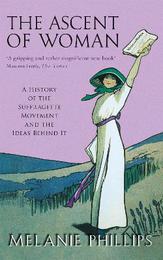
|
The Ascent Of Woman: A History of the Suffragette Movement
Paperback / softback
Main Details
| Title |
The Ascent Of Woman: A History of the Suffragette Movement
|
| Authors and Contributors |
By (author) Melanie Phillips
|
| Physical Properties |
| Format:Paperback / softback | | Pages:384 | | Dimensions(mm): Height 133,Width 201 |
|
| ISBN/Barcode |
9780349116600
|
| Classifications | Dewey:324.6230941 |
|---|
| Audience | |
|---|
| Illustrations |
Section: 16, b/w
|
|
Publishing Details |
| Publisher |
Little, Brown Book Group
|
| Imprint |
Abacus
|
| Publication Date |
4 November 2004 |
| Publication Country |
United Kingdom
|
Description
The story of the fight to gain the vote for women is about much more than a peripheral if picturesque skirmish around the introduction of universal suffrage. It is an explosive story of social and sexual revolutionary upheaval, and one which has not yet ended. The movement for women's suffrage in the late nineteenth and early twentieth centuries prefigured to a startling extent the controversies which rage today around the role of women. Far from the stereotype of a uniform body of women chaining themselves to railings, the early feminist movement was riven by virulent arguments over women's role in society, the balance to be struck between self-fulfilment and their duties to family and children, and their relationship with men. Melanie Phillips' brilliant book tells the story of the fight for women's suffrage in a way which sets the high drama of those events in the context of the moral and intellectual ferment that characterised it.
Author Biography
Melanie Phillips is a DAILY MAIL and former SUNDAY TIMES columnist and broadcaster who is a regular panellist on Radio 4's THE MORAL MAZE.
Reviews'Gripping and rather magnificent' THE TIMES; 'A richly detailed history' DAILY TELEGRAPH; 'This highly enjoyable history gives an excellent sense of the vivid feuds, ideological divides and disputes which fractured the enlivened the progressive Victorian feminist movement' SUNDAY TELEGRAPH; '[A book] shot through with Phillips' customary clarity ... [she] shows beautifully that the vote was really symbolic of a far wider range of issues on which women were struggling to find a public voice' EVENING STANDARD
|